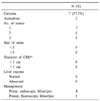Abstract
Purpose
Frequency of combined CBD stones on cholelithiasis has been known to range 5~20% in several reports, and diagnostic tools are USG, MDCT, MRCP and ERCP. Predictive factors of CBD stone for cholelithiasis were diameter of CBD, elevated liver enzyme, multiple small sized GB stones and concurrent pancreatitis. However, unsuspected CBD stone for acute cholecystitis is troublesome for patients and surgeons.
Methods
We retrospectively reviewed Percutaneous gallbladder drainage (PGBD) for acute complicated cholecystitis from October 1996 to October 2006. Indications for PGBD are clinical symptoms (sepsis) & signs of peritonitis and radiologic findings such as GB empyema, gangrenous cholecystitis and pericholecystic fluid collection. Total laparoscopic cholecystectomy was 1,357 cases, and PGBD for acute complicated cholecystitis was 13.8%.
Results
Combined CBD stone rate was 13.6%. Whereas, unsuspected CBD stone was 0.5% (9 cases), 7 in calculous and 2 in acalculous cholecystitis. No. of stone was 1 in 7 cases, 2 in 1 case and 3 in 1 case. Size of stone was less than 5 mm in all cases. Diameter of CBD was not increased in all cases (less than 1 cm) and liver enzymes showed no elevation in all cases. Management for unsuspected CBD stone was preoperative endoscopic lithotripsy in 8 cases and postoperative fluoroscopic lithotripsy in 1 case.
Figures and Tables
References
1. Thierry M, Simon M, Alain C, Claude R, Nathalie B, Jean-Marie H, et al. Diagnosis of asymptomatic common bile duct stones: preoperative endoscopic ultrasonography versus introperative cholangiography - a multicenter, prospective controlled study. Surgery. 1988. 124:6–13.
2. Kim JS, Cho BS, Kang YJ, Park JS. Effect of percutaneous cholecystostomy on laparoscopic cholecystectomy. J Korean Surg Soc. 2001. 60:78–82.
3. Rattner DW, Ferguson C, Warshaw AL. Factors associated with successful laparoscopic cholecystectomy for acute cholecystitis. Ann Surg. 1993. 217:233–236.
4. Haim P, Rivka Z, Eran R, Igal G, Eugene K, Mordechai G. Prospective evaluation of patients with acute cholecystitis treated with percutaneous cholecystostomy and interval laparoscopic cholecystectomy. Int J Surg. 2006. 4:101–105.
5. Kim DG, Oh CH, Kim GH, Park BG, Kim WG. Percutaneous gallbladder drainage for delayed laparoscopic cholecystectomy in patients with acute cholecystitis. Kor J HBP Surg. 2001. 60:78–82.
6. Matthew EC, Lori S, Crolyn K, Wells MA, Danna KA, Mark T. Prediction of bile duct stone and complication in gallstone pancreatitis using early laboratory trends. Am J Gastroenterol. 2001. 96:3305–3311.
7. Kenny PK, William L. Do preoperative indicators predict the presence of common bile duct stones during laparoscopic cholecystectomy? Am J Surg. 1996. 171:495–499.
8. Rémi H, Thierry P, Bernadette D, Marcelo S, Jean-François S. Predicting common bile duct lithiasis: determination and prospective validation of a model predicting low risk. Am J Surg. 1995. 170:38–43.
9. Majeed AW, Ross B, Johnson AG, Reed MWR. Common duct diameter as an independent predictor of choledocholithiasis: Is it useful? Clin Radiol. 1999. 54:170–172.
10. Shintaro K, Hiroyuki I, Masaski A, Nobuo T, Naoki S, Yosuke N, et al. Detection of common bile duct stone; comparison between endoscopic ultrsonography, magnetic resonance cholangiography and helical-computed-tomography. Eur J radiol. 2005. 54:271–275.
11. Byron EW, Martin LF, John KC, Robert RQ, Aloke KM. Current management of common bile duct stones: is there a role for laparoscopic cholecystectomy and intraoperative endoscopic retrograde cholangiopancreatography as a single-stage procedure? Surgery. 2002. 132:729–737.
12. Seyed AM, Mehdi M, Jafar N, Ahad AV, Ramin G, Reza M. Prospective evaluation of endoscopic ultrasonography in the diagnosis of biliary microlithiasis in patients with normal transabdominal ultrasonography. J Gastrointest Surg. 2005. 9:961–964.
13. Brian EL, Gina A, Richard WS. Choledocholithiasis - principles of diagnosis and management. Curr Surg. 2004. 61:290–293.




 PDF
PDF ePub
ePub Citation
Citation Print
Print




 XML Download
XML Download